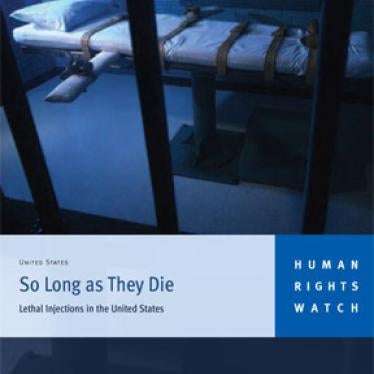The cornerstone of human rights is respect for the inherent dignity of all human beings and the inviolability of the human person. Human Rights Watch opposes capital punishment in all countries and in all circumstances because the inherent dignity of the person is inconsistent with the death penalty. This form of punishment is unique in its cruelty and finality, and it is inevitably and universally plagued with arbitrariness, prejudice, and error.
October 10, 2011 is the ninth annual World Day against the Death Penalty, and this year marks 35 years since the United States reinstated capital punishment in 1976. In that time, 1,271 people have been electrocuted, shot, hanged, gassed, or put to death by lethal injection. In September, the state of Georgia executed Troy Davis despite significant doubts about his guilt. Texas executed its 475th prisoner since 1976. During that time, Texas has by far executed the largest number of people of any US state.
Those responsible for serious crimes should be fairly and appropriately brought to justice, and the victims of crimes and their families should have access to the mechanisms of justice and redress. But it is increasingly recognized around the world that the death penalty is a fundamental assault on the right to life found in the Universal Declaration of Human Rights and international human rights treaties.
Innocent people have been sentenced to death in the United States. Since 1973, 138 prisoners have been released from death rows around the country after they were shown to be innocent of the crimes for which they had been sentenced to die. Some of them were released just days before they were scheduled for execution. The inherent fallibility of all criminal justice systems assures that even when full due process of law is respected, innocent people are likely to be executed. Because an execution is irreversible, such miscarriages of justice can never be corrected.
Race, poverty, and geography are inexorably intertwined with the death penalty. Defendants whose victims were white are more likely to be sentenced to death than those whose victims were members of a minority group. Poor defendants are generally represented by government-appointed counsel, who are often overworked and underpaid for the weighty responsibility of defending a person faced with the possibility of execution. Prosecutors in certain counties are more likely to seek the death penalty than those elsewhere in the same state. The accident of geography, and no other aspect of a particular crime, can mean the difference between life and death for the defendant.
The United States stands increasingly alone among democratic countries in its continued use of the death penalty. By retaining capital punishment in a world that has largely turned its back on this barbaric practice, the US damages its reputation, causes friction with its closest neighbors and allies, and undermines its efforts to promote human rights at home and abroad.
For all of these reasons, the death penalty is becoming increasingly rare in the United States. The numbers of executions and death sentences per year have decreased by half in the last 10 years. Four states have abolished the death penalty in the past four years, raising the total number of states prohibiting capital punishment to 16, plus the District of Columbia. Death as a punishment is becoming more and more unusual because it is increasingly recognized as inherently cruel.
Human Rights Watch urges all jurisdictions in the United States to reject the death penalty, and in doing so, to reaffirm fundamental principles of human rights.







